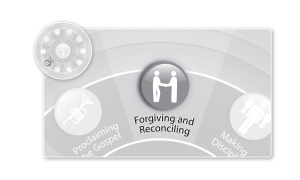 Post by Pastor Tim – My theology of forgiveness was tested when the church I pastored was confronted with a case of child abuse by a church deacon. Some of the congregation almost instantly forgave this man and seemed to welcome him back to full fellowship without much thought. People quoted scriptures such as Matthew 18:21-22 as evidence for the need to forgive him. They were convinced that the Scripture mandated them to wholly forgive, and that this forgiveness meant a full restoration to the way things used to be.
Post by Pastor Tim – My theology of forgiveness was tested when the church I pastored was confronted with a case of child abuse by a church deacon. Some of the congregation almost instantly forgave this man and seemed to welcome him back to full fellowship without much thought. People quoted scriptures such as Matthew 18:21-22 as evidence for the need to forgive him. They were convinced that the Scripture mandated them to wholly forgive, and that this forgiveness meant a full restoration to the way things used to be.
Despite the obvious concerns with the congregations’ handling of the abuser, the need for Christians to forgive is found within the pages of Scripture. The parable that follows the often quoted Matthew 18:21-22 shows the consequences of a servant not passing on forgiveness like he was originally granted by the king. And following the Lord’s Prayer, Jesus clearly warned the disciples against unforgiveness when he said,
For if you forgive others their trespasses, your heavenly Father will also forgive you, but if you do not forgive others their trespasses, neither will your Father forgive your trespasses (Matthew 6:14-15).
But there is still the question of what is the difference between forgiveness and reconciliation? Both forgiveness and reconciliation are rooted in the Cross, in that they were given while we were still God’s enemies (Romans 5:10). But G.E. Ladd refers to this as the objective character of reconciliation rather than the subjective character. Ladd says,
The content of reconciliation, therefore, while first of all the objective act of God, is also the affirmative reaction of people to the proffer of reconciliation. Only then does reconciliation become effective for the sinner; only then is he or she reconciled to God (Ladd, A Theology of the New Testament, 496)
In other words, complete reconciliation can’t happen unless two parties are involved. Forgiveness inevitably involves the offer of reconciliation, but unless the offer is accepted, it is still only an offer and not yet a restoration of the relationship.
And even more important than the difference between reconciliation and forgiveness is the understanding that even when forgiveness is present, there are still consequences to sin. Even though King David repented of adultery and murder, he still suffered the consequences of his own sin (2 Samuel 12:14).
In a case of abuse (like the one mentioned above), the consequences of sin might necessitate a removal from the victim, other children, and even the church body at large. This removal isn’t a sign that forgiveness isn’t being offered, but that the sin has necessitated certain consequences.
In other words, forgiveness and reconciliation may be offered freely, but it is never “cheap.” If it is offered in a quick, cheap, or cavalier manner, it’s possible that those offering it don’t understand the costly manner in which forgiveness was first offered by Christ and how it is passed on to others.
Bonhoeffer’s definition of “cheap grace” applies to our discussion on interpersonal forgiveness when he said, “Cheap grace is the preaching of forgiveness without requiring repentance, baptism without church discipline. Communion without confession. Cheap grace is grace without discipleship, grace without the cross, grace without Jesus Christ.”











Thanks for your thoughts here Tim. Cheap forgiveness leads to lots of problems.
Thanks for reading and commenting Chris! It’s good to find your blog as well.
I give prais alweys to my god by your minstry
Pingback: Should We Forgive the Unrepentant? | Do the Word